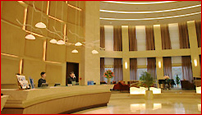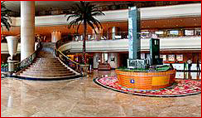| Chongqing Hotels in Package |

Holiday Inn, Chongqing    

JW Marriott Hotel Chongqing
    
|
|
Chongqing 3 days 2 nights Tour
About Chongqing Local Tour
Yangtze River. It is a metropolis under the direct jurisdiction
of the Central Government. Chongqing, also known as Yu, was
established some 3,000 years ago. Renowned for its romantic mountains,
rivers, and fog, Chongqing is an ideal spot for relaxation. The
majority of the buildings in Chongqing are located on the hillsides
and mountains surrounding the city. The climate in Chongqing is often
cloudy and misty with an average annual precipitation of about l, 000
millimeters. As a consequence, it is also called the "City of Fog."
Chongqing has many places of interest in both its urban and rural
regions. Traveling eastward along the Yangtze River, one can enjoy the
magnificent Three Gorges. Every year from May through June, the Three
Gorges International Travel Festival is held in Chongqing.
Highlights:
• Discover and learn about Chongqing’s diverse and surprising
history, along with trying some of the spiciest food you’ll ever
dare to eat!
• Chongqing is the fastest growing city in the world. Come find
out what makes Chongqing such a dynamic and invigorating travel
experience
• Pick-up and drop-off from the airport is included in the price
of this tour
B=(Breakfast) L=(lunch) D=(dinner) DEPARTURE: Daily
|
|
| |
TOUR ITINERARY |
 |
Tour
code:
GWAC-CQ-01 |
|
| DAY 01 |
Arrive in Chongqing
You will fly into the Chongqing airport, and
upon arrival you’ll be met by your travel guide,
who will then take you to your hotel. This huge
city, both in terms of land size and total
population, is near the end of the navigable
part of the Yangtze River for large ships. It
was a part of Sichuan Province, but it was made
a “municipality” in 1997. In China, a
municipality is a big city with a big territory.
Chongqing is one of four municipalities in the
country. It is a city with a long history, and
it was important as an inland port near the rich
Sichuan region. Traders came to Chongqing
overland and by river. It is located at the
place where the Jialing River meets the Yangtze
River.
After you unpack your things, the rest of the
night can be spent at your discretion. You might
want to pay a visit to the nearby Pipa mountain,
where after a short climb you will be treated to
a bird’s eye view of the city, which is even
more incredible at night, with neon and lights
that fill up the sky.
|
|
3 or 4 star for common; 5 star for deluxe |
|
| DAY 02 |
Chongqing (B, L)
Following breakfast in the hotel we’ll get
started with a visit to the Stillwell Musem.
This former house was once used by the National
Government as the house for distinguished
guests. After General Joseph W. Stilwell's
arrival in Chongqing on March 4, 1942, the place
was made his headquarters and residence. Every
time when he came to Chongqing during his
two-year-and-eight-month service in China
Theatre, the general lived here and conducted
military conferences, held press meeting and met
Chinese and foreign visitors.
The house was reconstructed and used be the
government after 1949. It was turned into the
Gen. Stillwell museum in 1991 by the Chongqing
People's Municipal government. On display in the
museum is an extensive display of mostly
US-supplied photos, documents, articles and
video.
After our time at the Stillwell Museum you’ll
learn a little bit more about the history of
Chongqing at the Chongqing (also known as the
Three Gorges) Museum. The museum has four big
themes: “The Splendid Three Gorges,” “The Very
Ancient Ba Yu,” “The Urban Development of
Chongqing,” and “The Anti-Japanese Days.” There
are displays of antique art. There is a large
model of the entire dam project, and information
is presented about this impressive engineering
achievement. There are also films shown about
the bombing of Chongqing during WWII by Japanese
planes and about the natural scenery in the
Three Gorges area before the construction of the
dam.
One of the reasons the building was built was to
house the relics from the sites destroyed by the
construction of the 3 Gorges Dam. So you’ll find
displays of saved artifacts from sites all over
the huge submerged area. The shape of the
building itself is like that of a large dam.
There is a blue sunscreen in front that may
represent the water of the Yangtze River or the
lake itself held by the dam.
There are also dinosaur skeletons on display
that are from nearby Zigong in Sichuan Province
and places around there. The Dashanpu dinosaur
fossil site in Zigong held numerous fossil
skeletons.
To cap off our touring for the day we’ll take a
stroll through the iconic village of Ciqikou.
It was once was a prominent market and trade
town next to Chongqing. In the Ming Dynasty, it
was a river port and market town. Goods were
transported over land and water. Some buildings
have been renovated and preserved. Along the
streets are shops for porcelain and other items
and many restaurants and snack shops. So while
you are shopping, you can eat and drink
beverages at the same time. Some of the
teahouses have performances of traditional
Chinese music. It is a place to see more of how
Chongqing used to be, eat and shop.
Afterward, you can spend the rest of the evening
at your own discretion. However, you might want
to sample some of the local food, which is part
of the Sichuan family of spicy cuisine. The most
popular choice of course, is hot pot. A booming
business all-year-round, hot pot is a thriving
local tradition in Chongqing. Come nightfall,
hot pot restaurants and numerous sidewalk stands
open for business. Adorned with strand after
strand of colorful lights, hot pot businesses
come in all different shapes and sizes. You will
find that some are small, intimate shops, while
others consist of only a few tables with
umbrella covering for an alfresco dining
experience. You can find these hot pot spots
easily on many lanes and streets. On average, a
hot pot dinner should cost no more than 20 rmb
per person.
|
|
3 or 4 star for common; 5 star for deluxe |
|
| DAY 03 |
Chongqing-depart (B)
After breakfast in the hotel you will be taken
to the Chongqing airport, where you will fly on
to your next destination. |
|
|
|
|
Note:
Currency change rate:
1 US$ ≈6.8 yuan (RMB)
Tour Inclusions:
1. Hotels with daily western
breakfasts;
2. Meals in accordance with
that listed on the itinerary.
3. professional local guide
& driver;
4. Private air-conditioned
car or van for transportation;
5. Admission of the first
gate.
6.Two bottles of mineral
water per day.
Tour exclusions:
1. Tip of the guide
2. Personal costs
|
|

